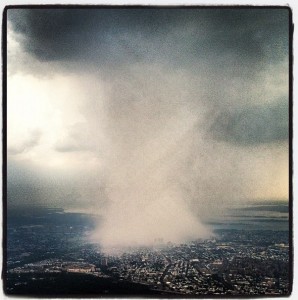Top Ten Things Climate Change Is Making Worse Right Now
 The onslaught of extreme weather and record temperatures this year have had an impact on people globally, directly through drought and temperature, and more indirectly impacting food prices and public transportation.
The onslaught of extreme weather and record temperatures this year have had an impact on people globally, directly through drought and temperature, and more indirectly impacting food prices and public transportation.Here are 10 impacts we’re seeing right now that climate change is very likely worsening, in some cases playing a major role:
Rising Food Prices
Over half of the Continental U.S. is now facing severe drought–the worst in fifty years. As a result of extreme temperatures and little rain, corn production suffers although analysts predicted record production at the start of the year. In coming months, record-high food prices will continue to rise, affecting thousands of supermarket products. See also “Story of the Year: Warming-Driven Drought and Extreme Weather Emerge as Key Threat to Global Food Security.”
Goodbye Glaciers, Sea Ice
This week, an iceberg twice the size of Manhattan tore itself off of one of the largest glaciers in North Greenland, following another break of comparable size in 2010. Scientists say that such dramatic change is unprecedented, and report that “the Arctic had the largest sea ice loss on record for June.” [ClimateProgress]
Landslides
A recent landslide on an Alaskan glacier was massive enough to register as a 3.4-magnitude earthquake, even recorded in Canada. “We are seeing an increase in rock slides in mountain areas throughout the world because of permafrost degradation,” a scientist said. [Huffington Post]
Massive Dust Storms
In addition to dangerous wildfires and drought, the current heat wave is helping to create massive dust storms in Arizona. These walls of dust and strong wind can be thousands of feet high, destroying property, setting of a chain of further environmental damage and killing an average of five people per year. [New York Times]
Toxic Algae Pollute Drinking Supply, Lakes: Spurred by warmer winters that prevent seasonal a die-off, Lake Zurich in Switzerland is seeing an increase in a toxic species of algae known as Burgandy blood algae. “Research on Lake Zurich in Switzerland reveals that Burgundy blood algae, a toxic cyanobacteria species, has become more dense in the last 40 years as warm winters prevent seasonal die-off.” [CBS News]
$1.5 Billion Hail Damage: In a striking example of current dramatically unpredictable weather patterns, some cities now experiencing record-breaking temperature highs are also dealing with the after-effects of extreme hail damage. Estimates suggest that total damage in places like Dallas, St. Louis and Norfolk, Nebraska could exceed $1.5 billion. [Inside Climate News]
Wildfire Causes $450 Million Damage In Colorado
States like Colorado and New Mexico have experienced their worst wildfire season on record, and the damage totaled an estimated $450 million in Colorado alone. However, there are additional costs of the fire. “Water quality, for example, is being compromised up to 100 miles from burn sites,” and air quality has been damaged, even indoors. [Washington Post]
Greater Terrors For Mountain Climbers: “Sharper seasonal variations of ice and snow and temperature are being repeated all across the world from the Himalayas to the Andes, which scientists say are driven by a higher level of energy in the atmosphere from global warming.” Veteran climbers “say today’s conditions are combining to create a volatile highball of risk.” [NY Times]
More Drilling In The Arctic, Taxpayers Pay For Risks: Ironically, oil companies are capitalizing on ice melt in the Arctic caused by global warming. “Royal Dutch Shell has spent $4.5 billion since 2005 preparing to explore for oil off Alaska’s north coast in the Arctic. U.S. taxpayers may end up paying almost as much to supervise future operations in the region.” [Bloomberg]
Blackouts
Extreme temperatures stress the power grid, and Con Edison recently took action to lower power voltage, known as a “brown out” in NYC, to prevent mass black outs. Of course, millions suffered from blackouts during brutal heat after a rare, heat-fueled derecho impacted the Washington area. [Reuters]
You can return to the main Market News page, or press the Back button on your browser.

